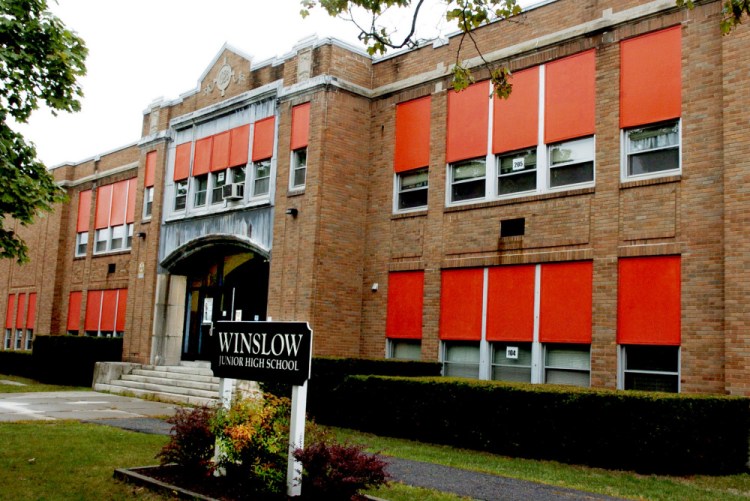WINSLOW — Town councilors called for two public hearings to be held on a $10.33 million bond for major school renovations and consolidation ahead of a November referendum on the bond, with the issue of dwindling student enrollment lingering over the future of the schools.
At their regular meeting Monday, councilors tentatively picked Oct. 10 and Oct. 30 as the dates for public hearings. Chairman Steve Russell proposed using the current performing arts center at Winslow High School. Much debate has occurred over the need for a revamped arts center there.
The bond is necessary to fund a plan to shift middle school classes to both the high and elementary schools. If passed by voters, it will pay for school renovations and consolidation to accommodate seventh- and eighth-graders at the high school and sixth-graders at the elementary school. Winslow Junior High School would close.
The proposed project would add nine classrooms to the high school for those younger students, parking spaces at both schools and a performing arts center for just under $3 million. That also includes money to pay demolition costs, if necessary.
Town Manager Mike Heavener said the town could push principal payments off for five years and make lower repayments in the first cycles and larger ones at the end, which would allow the town to pay off smaller debts before the larger amounts for the schools came due. Councilor Ken Fletcher said the town would accrue $460,000 of additional interest by not making those principal payments.
That was an example of a strategy the town could use, Heavener said, adding that it has flexibility. Fletcher agreed, saying they had a few more months to think about costs. The town also could “look at the bigger economic picture,” Fletcher said, adding that if it decided to liquidate some assets, that could be a way to minimize the effect of the cost for the schools.
The public hearings are seen as a way to ensure the town does everything to reach as many people as possible. Typically, the town uses social media and television spots to let people know what’s going on, but Russell acknowledged that many people in the town do not use social media.
“We realize some of the social media will not be available to everyone,” he said.
Gay Mayhew, a town resident, spoke against the improved arts center. She said she put five children through the school system and now lives on Social Security. She said she was “dead set against” the arts center, saying “want is not need.”
“I want a lot of things. I can’t have them,” she said. “If the school wants to have an arts center, let the people who want it raise the money themselves.”
Discussions about the school project have been contentious. Even the council was divided on whether to send it to referendum, ultimately voting 4-3 in favor of that.
There have been concerns about how the project would affect tax rates. Currently the tax rate is $15.74 per $1,000 of assessed property value, but the rate will increase to $16.74 for the next tax bill to cover budgeting shortfalls. Earlier this summer, Fletcher said approval of the $10.33 million bond would boost the tax rate by an additional $1.07 for every $1,000 of assessed property value.
The question of why the town wasn’t looking at consolidating schools with Waterville, which is part of Alternative Organizational Structure 92, was raised. Councilor Trish West said that was explored early on in the process, but that it was shot down. Russell said it was possible that option could be looked at again, depending on how the referendum goes.
At an earlier meeting, the council and representatives of the Winslow School Board butted heads after the council proposed creating a joint ad hoc committee on finance and performance. At that time, School Board Chairman Ron Whary said there was a “definite lack of trust” between the board and the Town Council. The council unanimously approved the committee, but Whary said it was unnecessary.
Fletcher, at Monday’s council meeting, said that committee was necessary, especially with the forecast of decreasing enrollment. By 2020, he said, it was projected that the town would have 1,000 students, which would be a decrease of 500 students over a 20-year period. With enrollment going down, Fletcher said, that would mean a decrease in state funding.
“Something has to come into alignment,” he said.
Colin Ellis — 861-9253
cellis@centralmaine.com
Twitter: @colinoellis
Send questions/comments to the editors.




Success. Please wait for the page to reload. If the page does not reload within 5 seconds, please refresh the page.
Enter your email and password to access comments.
Hi, to comment on stories you must . This profile is in addition to your subscription and website login.
Already have a commenting profile? .
Invalid username/password.
Please check your email to confirm and complete your registration.
Only subscribers are eligible to post comments. Please subscribe or login first for digital access. Here’s why.
Use the form below to reset your password. When you've submitted your account email, we will send an email with a reset code.